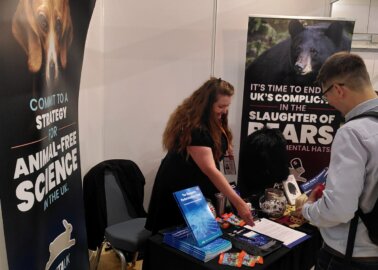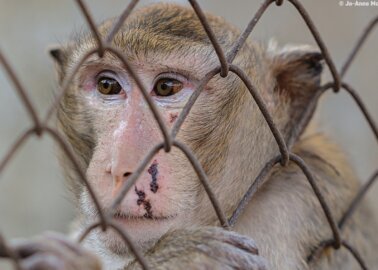COVID-19 Researchers Avoid Archaic Tests on Animals
With the world in the grip of a pandemic, scientists are working hard to develop much-needed treatments and vaccines for COVID-19. In the UK alone, the government has pledged an extra £20 million for research that seeks to understand, prevent, treat, and control the disease.
In this time of great uncertainty and confusion, there’s one thing we do know for sure: experimenting on animals is not only unethical but also unjustifiable from a scientific perspective.
The US National Institutes of Health (NIH) reports that 95 out of every 100 drugs that test safe and effective in animals go on to fail in human clinical trials. Mice – who have to be genetically engineered just to be susceptible to the disease – show only mild symptoms of COVID-19. Dr Stanley Perlman, a coronavirologist at the University of Iowa, notes that infecting mice “doesn’t really tell you much about how the virus causes disease”.

PETA and compassionate people everywhere were heartened to learn that, in order to speed up the development of a potential coronavirus vaccine, the NIH quickly began testing directly on humans without waiting for the results of some of the ordinarily required animal tests. This shows that the results yielded by tests on animals are not necessary and are slowing down the development of medicines that will help humans.
Given the scale and seriousness of this pandemic, researchers can’t afford to waste time conducting useless tests on animals.
Here are some more examples of innovative ways that coronavirus researchers are avoiding cruel and archaic tests on animals in favour of cutting-edge, human-relevant methods:
- Three-dimensional reconstructed human respiratory tissue models, such as those from Epithelix Sàrl and MatTek Life Sciences, can be used to study COVID-19 infection and screen for potential treatments. A long-time supporter of the two companies, the PETA International Science Consortium helped fund the development of a first-of-its-kind model of the lower respiratory tract, available from MatTek Life Sciences.
- YUMAB announced that it has created and confirmed the effectiveness of the first human-derived antibodies against the novel coronavirus. Researchers are turning to fully human antibodies because they don’t require animal use and are more scientifically robust and faster to make than animal-derived antibodies. The Science Consortium is co-organising a webinar series – which will start in July 2020 – in which experts will speak about the use of animal-free antibodies, including for the development of vaccines and treatments for diseases such as COVID-19.
- Scientists at Gauhati University, India, used advanced computer simulation methods to work out which parts of the virus are best suited to triggering an immune response in humans. This work could aid the design of safe and effective vaccines against COVID-19.
- Researchers at the University of Bristol are growing the virus in a variety of cell lines to investigate how the virus hijacks the cellular machinery and causes disease. Using this technique, they have already discovered that the virus mutates and becomes less relevant to humans when grown in monkey cell lines.
- In the Netherlands, researchers used intestinal organoids – state-of-the-art “miniature intestines” grown from human cells – to determine that the novel coronavirus can infect that organ. They say, “These findings could explain the observation that approximately one third of COVID-19 patients experience gastrointestinal symptoms.” They’re continuing to use human-relevant organoids as they investigate the differences between coronavirus infections in the intestine and in the lungs.
- Researchers at Oak Ridge National Laboratory in the US are using Summit – the world’s smartest and most powerful supercomputer – to identify existing drugs that could be effective in treating COVID-19 in humans. Based on the physical properties of the virus and of each drug, the computer predicts how the two might interact. The effectiveness of promising drugs can then be measured by testing them on cells infected with the virus.
- The UK government has approved a study in which up to 90 healthy human volunteers between the ages of 18 and 30 will be exposed to SARS-CoV-2. This research – the first of its kind for the novel coronavirus – aims to support the pandemic response by aiding the development of vaccines and treatments. To ensure participants’ safety, they will be monitored constantly and scientists will infect them with a version of the virus that’s been shown to pose a low risk to young, healthy adults. Clive Dix, PhD, interim chair of the UK Vaccines Taskforce – the government group charged with leading the country’s efforts to develop COVID-19 vaccines – commented on the importance of the research, saying, “We have secured a number of safe and effective vaccines for the UK, but it is essential that we continue to develop new vaccines and treatments for COVID-19. We expect these studies to offer unique insights into how the virus works and help us understand which promising vaccines offer the best chance of preventing the infection.”
Join the Humane Science Revolution
The tide is turning, and more and more forward-thinking scientists are adopting research methods that benefit humans without harming animals. Help keep up this momentum by putting pressure on the UK government to commit to ending the use of animals in experiments:



